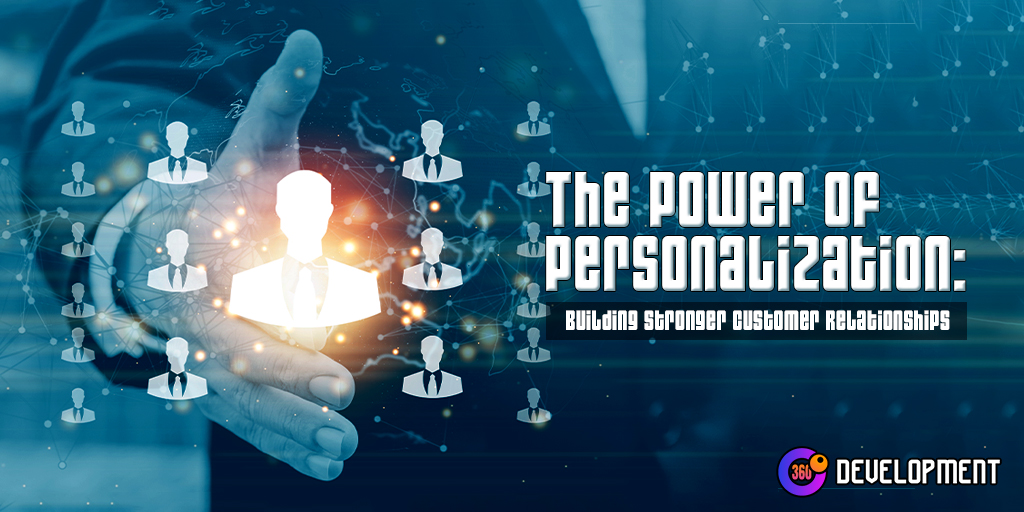The Power of Personalization: Building Stronger Customer Relationships
In today’s fast-paced and highly competitive business landscape, building and maintaining strong customer relationships is essential for long-term success. Customers are no longer satisfied with generic, one-size-fits-all interactions. They crave personalized experiences that cater to their specific needs and preferences. This article delves into the power of personalization in strengthening customer relationships, and it provides actionable insights to help businesses thrive in the era of individualization.
The Power of Personalization: Building Stronger Customer Relationships
Personalization is a strategic approach that involves tailoring products, services, and marketing efforts to suit the unique preferences and behaviors of individual customers. By understanding and responding to customers’ specific needs, businesses can foster deeper connections and increase customer loyalty. Let’s explore how personalization can drive stronger customer relationships:
1. Understanding Your Customers on a Deeper Level
Incorporate LSI Keywords: Customer insights, Data analysis, Individual preferences
To provide personalized experiences, you must first understand your customers on a deeper level. Utilize data analysis tools and customer feedback to gain valuable insights into their preferences, pain points, and purchase behavior. By capturing and analyzing this data, you can identify patterns and create customer segments, enabling more targeted and relevant interactions.
2. Tailoring Products and Services to Meet Specific Needs
Incorporate LSI Keywords: Customization, Tailored solutions, Unique offerings
Customers appreciate when businesses cater to their individual needs. Use the insights gathered from data analysis to create personalized product recommendations, exclusive offers, and tailored solutions. This level of customization shows that you genuinely care about your customers’ requirements, leading to increased satisfaction and loyalty.
3. Personalizing Marketing Messages and Campaigns
Incorporate LSI Keywords: Targeted marketing, Personalized content, Segment-based campaigns
Shift away from generic marketing campaigns and embrace personalized communication. Craft targeted messages that speak directly to each customer segment, addressing their pain points and aspirations. Personalized content resonates more effectively, driving higher engagement and conversion rates.
4. Utilizing Customer Journey Mapping
Incorporate LSI Keywords: Touchpoints, User experience, Seamless interactions
Map your customers’ journey across various touchpoints, both online and offline. Identify potential pain points and areas for improvement. Offering a seamless and personalized user experience at each stage of the journey helps build trust and fosters lasting relationships.
5. Implementing Dynamic Website Personalization
Incorporate LSI Keywords: Website customization, User behavior, Real-time updates
Leverage technology to personalize your website experience in real time. Dynamic website personalization uses data-driven insights to deliver content and offers that align with each visitor’s preferences and behavior. This level of personalization enhances user satisfaction and drives higher conversion rates.
6. Leveraging Personalization in Email Marketing
Incorporate LSI Keywords: Segmented emails, Behavioral targeting, Email Automation
Email marketing remains a powerful tool for engaging customers. Segment your email lists based on customer preferences and behavior. Utilize behavioral targeting to deliver relevant and timely messages that resonate with each recipient. Automated personalized emails can nurture leads and drive repeat purchases.
7. Embracing the Power of Artificial Intelligence
Incorporate LSI Keywords: AI-driven personalization, Machine learning, Predictive analytics
Artificial Intelligence (AI) empowers businesses to deliver hyper-personalized experiences at scale. AI-driven algorithms can analyze vast amounts of customer data and predict individual preferences and behavior. Implement AI-powered tools to recommend products, content, and solutions tailored to each customer.
8. Personalization in Customer Service
Incorporate LSI Keywords: Support interactions, Customer empathy, Human Touch
Empower your customer service team to provide personalized support interactions. Train them to empathize with customers’ concerns and offer tailored solutions. Genuine human connection in customer service builds trust and loyalty.
9. Measuring and Analyzing Personalization Effectiveness
Incorporate LSI Keywords: Key performance indicators, Customer feedback, Continuous improvement
Measure the effectiveness of your personalization efforts using key performance indicators (KPIs) like customer satisfaction, retention rates, and conversion rates. Gather feedback from customers to identify areas for improvement continually.
FAQs
How can I collect customer data to personalize experiences effectively?
To collect customer data, implement tools like website analytics, customer surveys, and CRM systems. Analyze this data to gain valuable insights into customer preferences and behavior.
What are the benefits of personalization for businesses?
Personalization can lead to increased customer loyalty, higher conversion rates, improved customer satisfaction, and reduced churn.
Is personalization only suitable for large businesses?
No, personalization is beneficial for businesses of all sizes. Small businesses can use personalized strategies to compete effectively and build strong customer relationships.
How can AI enhance personalization efforts?
AI can analyze vast amounts of data to predict customer preferences, offer personalized recommendations, and automate personalized interactions across various channels.
Are there any privacy concerns associated with personalization?
Yes, privacy concerns exist, and it’s essential to handle customer data responsibly and transparently. Implement robust data security measures and obtain explicit consent for data usage.
Can personalization be applied to B2B businesses?
Absolutely, B2B businesses can also leverage personalization to provide customized solutions, relevant content, and personalized customer service.
Conclusion
The power of personalization in building stronger customer relationships cannot be underestimated. By understanding your customers on a deeper level, tailoring products and services, personalizing marketing efforts, and embracing AI-driven strategies, you can create exceptional customer experiences that lead to increased loyalty and business growth. Remember, successful personalization requires continuous improvement and a commitment to putting the customer at the heart of your business.

